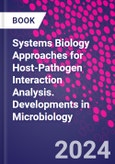Application and utilization of data science approaches has revolutionized scientific research including host-pathogen interaction analyses. Host-pathogen interactions are generally considered highly specific interactions, resulting in a variety of consequences. Data science approaches coupled with network biology has taken host-pathogen interaction analysis from specific interaction to a new paradigm of understanding the consequences of these interactions within a biological network. Unfortunately, basic biological researchers are mostly unaware of these advancements. Conversely, data scientists are not familiar with biological aspects of such data.
Systems Biology Approaches for Host-Pathogen Interaction Analyses benefits biological researchers by expanding the scope of their research and utilization of their accumulated data using recent technological advancements. In addition, the book also opens avenues for bioinformatics and computer science researchers to utilize their expertise in biologically meaningful ways.
Please Note: This is an On Demand product, delivery may take up to 11 working days after payment has been received.
Table of Contents
1. Host-pathogen interactions: a general introduction2. Host-pathogen interactions: databases and approaches for data generation
3. Generation of host-pathogen interaction data: an overview of recent technological advancements
4. Molecular omics: a promising systems biology approach to unravel host-pathogen interactions
5. Computational methods for detection of host-pathogen interactions
6. Biological interaction networks and their application for microbial pathogenesis
7. Dual transcriptomics data and detection of host-pathogen interactions
8. Functional overrepresentation analysis and their application in microbial pathogenesis
9. Advancements in systems biology-based analysis of microbial pathogenesis
10. Host-pathogen interactions with special reference to microbiota analysis and integration of systems biology approaches
11. Role of noncoding RNAs in host-pathogen interactions: a systems biology approach
12. Systems biology in food industry: applications in food production, engineering, and pathogen detection
Authors
Mohd. Tashfeen Ashraf Assistant Professor in School of Biotechnology, Gautam Buddha University. Mohd. Tashfeen Ashraf is currently working as Assistant Professor in the School of Biotechnology, Gautam Buddha University (GBU). After securing his Master's degree in biochemistry, he earned his Doctorate in Biotechnology from Aligarh Muslim University, India, during which he characterized the folding intermediates of various proteins. His research area involves the study of folding behavior of proteins, their structure-function relationship, and protein-protein interactions under normal and disease conditions. Abdul Arif Khan College of Pharmacy, King Saud University, Saudi Arabia.Abdul Arif Khan is a Microbiologist by training with an interest in the field of host-pathogen interactions, systems biology, and cancer biology. He has received several awards and Fellowships from national and international organizations, including the Royal Society for Public Health and the Federation of European Microbiological Societies. He is a recipient of several grants for his research on artificial Intelligence and host-pathogen interactions. He is credited with several papers and books related to systems biology and host-pathogen interaction analysis.
Fahad M. Aldakheel Department of Clinical Laboratory Sciences, College of Applied Medical Sciences, King Saud University, Riyadh, KSA.Fahad M. Aldakheel is an Associate Professor of Clinical Immunology at the Department of Clinical Laboratory Sciences, College of Applied Medical Sciences at King Saud University in Riyadh, Saudi Arabia. He obtained his PhD from the University of Melbourne, Australia. He is a board member of the Saudi Society for Clinical Laboratory Sciences. He has several scientific publications in national and international journals, and is also working as a member and a reviewer in several scientific organizations.








